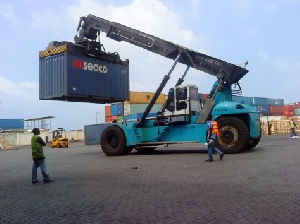Government’s decision to enact Section 43 of Act 819 of the Ghana Revenue Authority Law (2015) to place the business of Customs brokerage in the hands of locals in the shipping industry is a laudable move that places freight-forwarders in a better position to support national socio-economic growth.
President of the Ghana Institute of Freight-Forwarders (GIFF), Kwabena Ofosu-Appiah, told the B&FT in an interview: “That singular decision by government will reap immense dividends for the economy, as it will help to boost the capacity of locals in the Customs brokerage business to grow their profit margins and contribute meaningfully to national development.
“Also, for the indigenous Ghanaian business person, whatever profit he/she earns from the business by way of law remains in the country; and so this directive will translate to more revenue into the national coffers aside from creating jobs and wealth for the teeming unemployed youth.”
Section 43 of Act 819 exclusively puts the business of Customs brokerage in the hands of indigenous Ghanaians, but the lack of enforcement has seen several malpractices in the business that ended up out-muscling the Ghanaian industry player.
The GIFF boss narrated one of such experiences: “There are certain practices going on in the industry where people—mostly foreign players in the business—give juicy offers to clients in a manner that depicts elements of under-trust, transfer pricing and monopoly-setting in cabal-style.
“And what that meant was if we were not careful to put some of these things into law or on the statute books, there was coming a time when the indigenous businesses would not get the best of jobs to do. We commend government for trying to hold down the Customs brokerage business for the indigenes.”
According to Ofosu-Appiah, the argument that local players in the industry do not have the capacity to move project cargo was what kept the business in the hands of multinationals, but as long as the situation remained Ghanaians in the trade would always be out-muscled.
Going forward, he said, technocrats and negotiators must begin to argue for the Ghanaian broker to take charge of bidding for the business of clearance and haulage of consignments to the destination warehouse, as is done in other parts of the world.
The GIFF boss further indicated: “Ceding Customs brokerage to Ghanaians is the best practice security-wise in the wake of terrorism and related threats, as is being done in the United States and Thailand
“Freight-forwarders are the first people to get access to stuff coming into the country, and that fact that Ghanaians are taking charge of those consignment as and when they arrive in the country delivers a certain security.
“We needed to break the cycle wherein goods come to the ports and foreign firms want to intervene in the clearance process and haul the consignment with their trucks to destination with no local participation in the process, and that is why the new regulation comes in handy.”
Customs brokerage is a profession that involves the ‘clearing’ of goods through Customs barriers for importers and exporters.
For one to become a Customs broker, he/she has to belong to one of three institutions—Ghana Institute of Freight Forwarders (GIFF), Customs Brokers Association of Ghana (CUBAG), or the Freight-forwarders Association of Ghana (FFAG).
At any point in time, the qualified broker must have clearance from one of these three associations before his/her licence can be renewed by the Customs Division of the Ghana Revenue Authority (GRA).
According to Mr. Ofosu-Appiah, GIFF is currently religiously looking into the shareholding structure of companies outside this bracket—in the wake of the new law—in a manner that ensures improved local participation in the business.
Business News of Friday, 6 May 2016
Source: B&FT

















